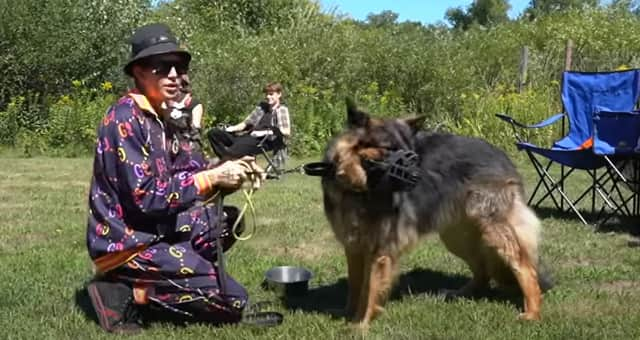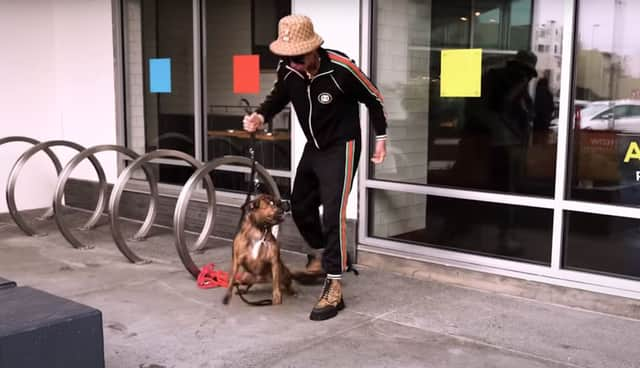Who is The Dog Daddy? RSPCA warns controversial trainer's methods could 'traumatise' dogs ahead of UK seminars
The controversial methods of a US dangerous dog trainer who will soon be holding seminars in the UK have caused the RSPCA to warn they could do irreversible harm to frightened dogs.
Social media star 'The Dog Daddy' - who has millions of followers across his various social media platforms - has taken his show on the road, and has scheduled training seminars for aggressive and reactive dogs in London this coming weekend (September 9 and 10), before heading on to Italy and Australia, later this month.
Advertisement
Hide AdAdvertisement
Hide AdThe RSPCA warn that Augusto Deoliveira uses aversive training techniques and equipment designed to cause pain and fear in dogs to stop dangerous behaviours, and wants the public's help to find out where his "secretive" sessions are being held.
Their dog behaviour expert told NationalWorld techniques like those in The Dog Daddy's viral videos can sometimes traumatise dogs so much they can no longer be helped, while the trainer says he is giving dogs who would otherwise need to be euthanised a second chance.
But who exactly is he, and why are his methods so controversial? And what does the RSPCA say is the best method for helping aggressive dogs?
Here's everything you need to know.


Who is The Dog Daddy?
The Dog Daddy's real name is Augusto Deoliveira, and he is a US-based dog trainer with a large social media presence - maintaining active Youtube, Tiktok, and Instagram accounts.
Advertisement
Hide AdAdvertisement
Hide AdDeoliveira is known for his somewhat unorthodox appearance, and can be seen wearing designer tracksuits and sunglasses in almost all of his videos - and has a large pawprint tattoo with the words 'dog daddy' across his neck. His videos often feature stunts like walking five German shepherd dogs off-leash down Hollywood Boulevard, or training a formerly wild bear to lie down on command.
He also holds frequent travelling seminars where people bring along dogs that are aggressive or reactive towards either humans, or other dogs. According to his website, these three-hour training sessions cost US$400 for one dog - or about £320.
However, his training techniques have raised some eyebrows in the animal welfare community. In some of his training videos he advocates for the use of prong collars - collars with metal prongs that poke into the dog's neck when it pulls on its leash - for aggressive dogs, a training method the RSPCA is against.
Deoliveira has come under fire for many of his training videos, which even sparked protests at a recent seminar in Canada. Videos of these seminars, which have been seen by NationalWorld, show him jerking dogs off the ground by their collars to stop them from biting him.
Advertisement
Hide AdAdvertisement
Hide Ad

Why is the RSPCA concerned?
The RSPCA said it was concerned about reports Deoliveira uses aversive training techniques and equipment designed to cause pain and fear in dogs, and worried the sessions would "spread training techniques which risked compromising dog welfare".
Esme Wheeler, RSPCA dog welfare expert, said: “The RSPCA has received concerns about training techniques used by The Dog Daddy, who is based in the USA and is due to visit the UK in September.
“We, like many organisations, have significant concerns about the use of aversive training techniques and equipment [like] prong collars, which are designed to cause pain and fear. These can compromise welfare and are completely unnecessary," she continued.
The RSPCA said it has written to Deoliveira and raised its concerns with him, "and have also made him aware of the legislation in both England and Wales of which he must comply with when training dogs".
Advertisement
Hide AdAdvertisement
Hide AdProng collars specifically are not illegal in the UK. Ms Wheeler told NationalWorld the charity was also concerned about "any methods which aim to treat behaviour problems without addressing the underlying cause or changing how the dog feels", as this increased the chance of the behaviour happening again.
"Behaviour change takes considerable time, there are very rarely any quick fixes and the longer a behaviour has been practiced the longer it will take to resolve. Videos such as Deoliveira’s show worried and frightened dogs who may be inhibiting their response due to fear of anticipated consequences," she continued. "There is no justification for inducing states of fear or anxiety in any animal, it is wholly unacceptable."
The RSPCA's advice for owners concerned about aggressive behaviour was first of all, to get their pet checked by a vet to rule out any illness of injury that could be causing the problem. "Research has found that between 30-85% of behavioural issues in dogs have a contributory or causal medical [or] pain issue," she said.
Their vet could then refer them to an appropriate, qualified expert, she said, like an Animal Behaviour and Training Council-registered clinical behaviourist.
Advertisement
Hide AdAdvertisement
Hide Ad"Dog trainers all over the UK use ethical, science-based and reward-based methods to train dogs very effectively. Where dogs have behaviours which owners find unacceptable, such as aggression or destruction, appropriately qualified behaviourists achieve long term changes in behaviour through the use of established and validated techniques of behaviour modification, which do not subject dogs to training techniques which may cause pain or distress," Ms Wheeler continued.
"It is also important to note that dogs who are exhibiting ‘aggressive’ behaviours are in a negative emotional state which may be caused by pain, fear or frustration. In the case of behaviours which are rooted in anxiety, the application of punishment or any punitive, painful methods will only serve to intensify the fear."
Accredited behaviourists all too often witness the devastating consequences of this type of training, she said. "Some dogs will have been left so traumatised by the use of these methods that they are not able to be rehabilitated and may even have to be euthanised. "
The RSPCA said the venues for the upcoming seminars has not been announced, and at previous events have not been confirmed until hours before the show. Their "secretive nature" has prompted the charity to urge anyone with information to pass it along via social media - but not the charity’s emergency line.
Advertisement
Hide AdAdvertisement
Hide Ad“We are keen to discuss our concerns with the venues hosting this trainer."
What has he said about controversy over his training methods?
In a response to criticism of his training techniques posted on Instagram, The Dog Daddy said he has helped "thousands of owners and dogs".
"They have no grounds for the attacks against me, they rely solely on their beliefs that their methods are the only methods," he wrote. After "two decades" of training dogs and working with other trainers he said he had "learned exactly what is effective and what’s not as effective" at helping dangerous dogs improve their behaviour. "In many cases it’s either the training starts to work fast or the dog [has got to go], or get euthanised."
"I do not use excessive force, nor do I choke or suspend dogs by the neck... My clients and observers in my classes ironically describe my handling as soft and gentle," Deoliveira continued. He said his methods "open doors for my clients to be able to have their dogs fit in society and [make them] more able to adapt to our crazy world".
Advertisement
Hide AdAdvertisement
Hide Ad"I invite any of those trainers to work with a dog that I select... but they will be quick to come up with an excuse for why they won’t do it. It’s clear and evident that they cannot do it. Their methods are not effective when it comes to the class of dogs I particularly work with."
Comment Guidelines
National World encourages reader discussion on our stories. User feedback, insights and back-and-forth exchanges add a rich layer of context to reporting. Please review our Community Guidelines before commenting.
